Results
-
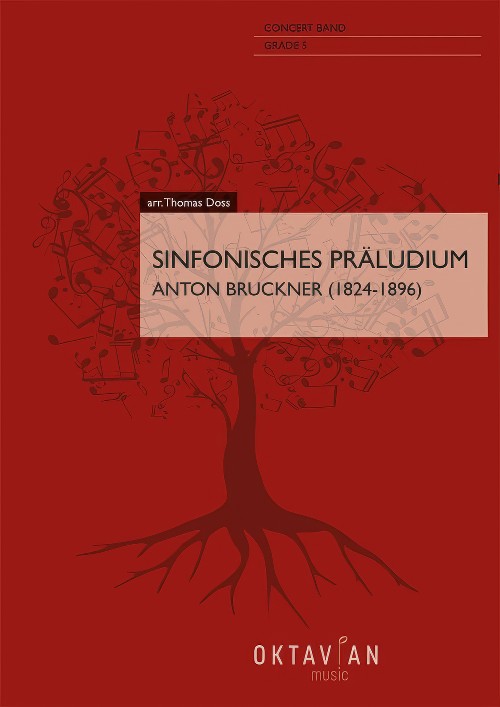 £119.20
£119.20Sinfonisches Praludium (Concert Band - Score and Parts) - Bruckner, Anton - Doss, Thomas
The Symphonic Prelude in C minor is an orchestral composition from the circle of the Austrian composer Anton Bruckner. The unearthing of this work, discovered shortly after World War II, has created confusion, leading to a second, reduced version being attributed to Gustav Mahler, a theory which still holds sway in musical circles today, although there is a high probability that the original composition is indeed by Bruckner himself. Rudolf Krzyzanowski (1895-1911), a pupil of Bruckner, transcribed the score in 1876. The 43-page manuscript bears the inscription Rudolf Krzyzanowski cop. 1876 on the first page; while on the last page is written in blue pencil: By Anton Bruckner. Thomas Doss used a facsimile of this autograph copy as the basic of his instrumentation of the prelude for symphonic wind orchestra.Duration: 6.15
Estimated dispatch 7-14 working days
-
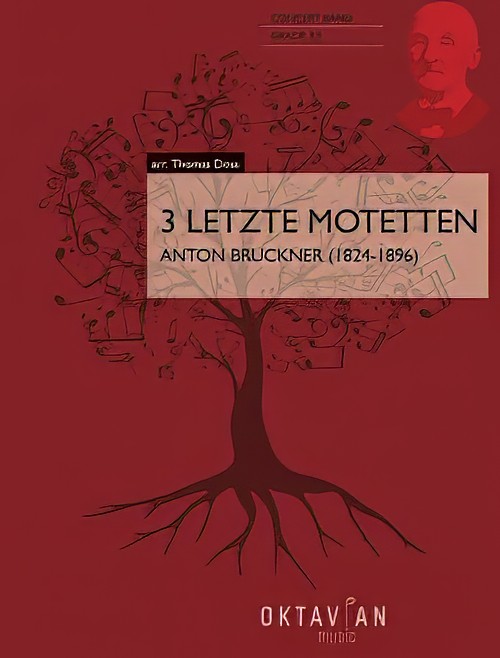 £123.20
£123.203 Letzte Motetten (Concert Band - Score and Parts) - Bruckner, Anton - Doss, Thomas
Anton Bruckner (b. 4.9.1824, Ansfelden, d. 11.10.1896, Vienna) didn't have it easy. Throughout his life, the Austrian composer was plagued by self-doubt. Anton Bruckner came from a simple, rural background. After the death of his father, he was accepted as a choirboy at the monastery of Sankt Florian in 1837. After several years as a school assistant and his own organ and piano studies, he first worked as organist in St. Florian, then from 1855 as cathedral organist in Linz. Introduced to music theory and instrumentation by Simon Sechter and Otto Kitzler, he discovered Richard Wagner as an artistic role model, whom he admired throughout his life and also visited several times in Bayreuth. In 1868 Anton Bruckner became professor of basso continuo, counterpoint and organ at the Vienna Conservatory; ten years later court organist; and in 1891 finally honorary doctor of the University of Vienna. He was considered an important organ virtuoso of his era, but had to wait a long time for recognition as a composer. It was not until Symphony No.7 in E major, composed between 1881 and 1883, with the famous Adagio written under the effects of Wagner's death, that he achieved the recognition he had hoped for, even if he was reluctant to accept it given his inclination towards scepticism and self-criticism. Anton Bruckner was a loner who did not want to follow a particular school or doctrine. He composed numerous sacred vocal works, such as his three masses, the Missa Solemnis in B flat minor (1854), the Te Deum (1881-84) and numerous motets. As a symphonic composer, he wrote a total of nine symphonies and many symphonic studies from 1863 onwards, tending to revise completed versions several times over. Bruckner's orchestral works were long considered unplayable, but in fact were merely exceptionally bold for the tonal language of their time, uniting traditions from Beethoven through Wagner to folk music, on the threshold between late Romanticism and Modernism. Anton Bruckner composed about 40 motets during his lifetime, the earliest a setting of Pange lingua around 1835, and the last, Vexilla regis, in 1892. Thomas Doss has compiled some of these motets in this volume for symphonic wind orchestra. These motets show many characteristics of personal expression, especially Bruckner's colourful harmony in the earlier works, which is in places aligned with Franz Schubert (changes between major and minor; and movements in thirds). Later works are characterised by many components which, in addition to the expanded stature of the movements, include above all a sense of the instrumentation as an outward phenomenon and the harmony as a compositional feature that works more internally. Some aspects of Bruckner's work are the result of his long period of study, which familiarised him not only with the tradition of his craft, but also gave him insights into the "modernity" of his time in such composers as Wagner, Liszt and Berlioz. From this developed his personal standpoint, which always pursues the connection between the old and the new.Duration: 14.00
Estimated dispatch 7-14 working days
-
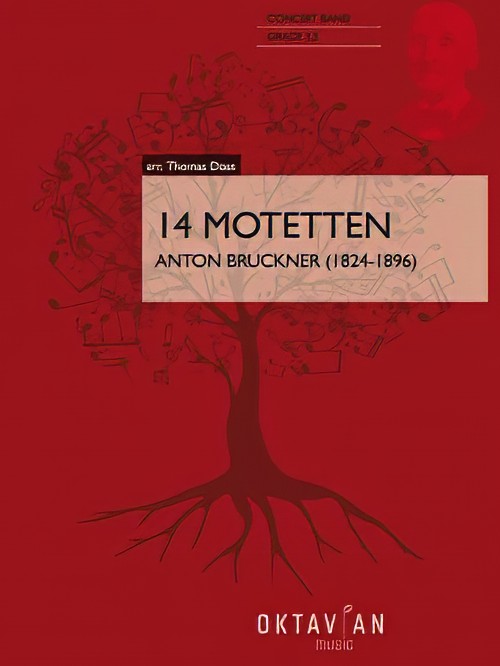 £256.00
£256.0014 Motetten (Concert Band - Score and Parts) - Bruckner, Anton - Doss, Thomas
Anton Bruckner (b. 4.9.1824, Ansfelden, d. 11.10.1896, Vienna) didn't have it easy. Throughout his life, the Austrian composer was plagued by self-doubt. Anton Bruckner came from a simple, rural background. After the death of his father, he was accepted as a choirboy at the monastery of Sankt Florian in 1837. After several years as a school assistant and his own organ and piano studies, he first worked as organist in St. Florian, then from 1855 as cathedral organist in Linz. Introduced to music theory and instrumentation by Simon Sechter and Otto Kitzler, he discovered Richard Wagner as an artistic role model, whom he admired throughout his life and also visited several times in Bayreuth. In 1868 Anton Bruckner became professor of basso continuo, counterpoint and organ at the Vienna Conservatory; ten years later court organist; and in 1891 finally honorary doctor of the University of Vienna. He was considered an important organ virtuoso of his era, but had to wait a long time for recognition as a composer. It was not until Symphony No.7 in E major, composed between 1881 and 1883, with the famous Adagio written under the effects of Wagner's death, that he achieved the recognition he had hoped for, even if he was reluctant to accept it given his inclination towards scepticism and self-criticism. Anton Bruckner was a loner who did not want to follow a particular school or doctrine. He composed numerous sacred vocal works, such as his three masses, the Missa Solemnis in B flat minor (1854), the Te Deum (1881-84) and numerous motets. As a symphonic composer, he wrote a total of nine symphonies and many symphonic studies from 1863 onwards, tending to revise completed versions several times over. Bruckner's orchestral works were long considered unplayable, but in fact were merely exceptionally bold for the tonal language of their time, uniting traditions from Beethoven through Wagner to folk music, on the threshold between late Romanticism and Modernism. Anton Bruckner composed about 40 motets during his lifetime, the earliest a setting of Pange lingua around 1835, and the last, Vexilla regis, in 1892. Thomas Doss has compiled some of these motets in this volume for symphonic wind orchestra. These motets show many characteristics of personal expression, especially Bruckner's colourful harmony in the earlier works, which is in places aligned with Franz Schubert (changes between major and minor; and movements in thirds). Later works are characterised by many components which, in addition to the expanded stature of the movements, include above all a sense of the instrumentation as an outward phenomenon and the harmony as a compositional feature that works more internally. Some aspects of Bruckner's work are the result of his long period of study, which familiarised him not only with the tradition of his craft, but also gave him insights into the modernity of his time in such composers as Wagner, Liszt and Berlioz. From this developed his personal standpoint, which always pursues the connection between the old and the new.Duration: 39.00
Estimated dispatch 7-14 working days
-
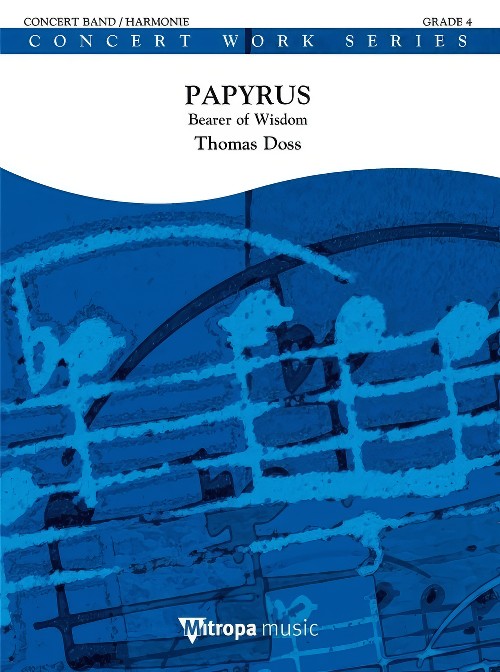 £139.99
£139.99Papyrus (Bearer of Wisdom) (Concert Band - Score and Parts) - Doss, Thomas
The history of paper ranges over more than five thousand years: likely starting around 3500 BC in old Egypt with the use of papyrus. The oldest findings of written paper date from 2700 BC. In China, the first production of paper took place in the year 105 AD. The Arabs acquired their knowledge of the art of making paper around 750 AD, thanks to Chinese prisoners of war. Around the same time, the Celtic Ogham script was created in Ireland and carved into stones or trees. In Europe, the first paper mill was not put into operation until the 12th century! No matter how different the production methods and its historical use, paper was always a way to pass on wisdom, art and knowledge. Even today, in the age of digitalisation, paper still has a somewhat 'sacred' image. With Papyrus, Thomas Doss has written a wonderful composition in which the history of paper is reflected, and listeners can very much hear the various periods of this history represented throughout the piece. Duration: 8.30
Estimated dispatch 7-14 working days
-
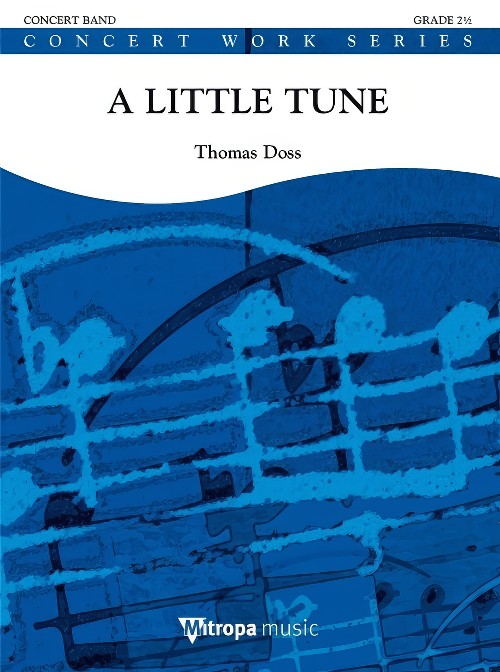 £74.99
£74.99A Little Tune (Concert Band - Score and Parts) - Doss, Thomas
It's the little things that enrich our lives and bring a smile to our faces: a sunrise, a beautiful memory, a friendly conversation or even just a lovely melody. Hopefully, you'll find this is also true for Thomas Doss' little tune which the composer had written for his wife and youngest son as a souvenir of their road trip through Ireland. Duration: 4.00
Estimated dispatch 7-14 working days
-
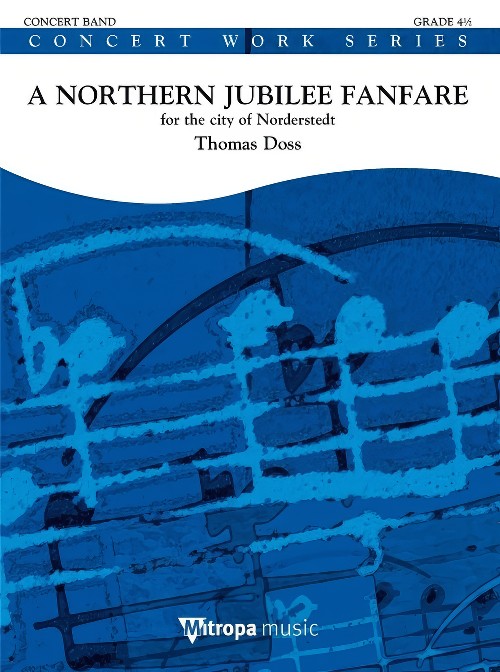 £104.99
£104.99A Northern Jubilee Fanfare (Concert Band - Score and Parts) - Doss, Thomas
A city celebrating a jubilee is always a very special occasion. This is certainly the case for the fiftieth anniversary of the German city of Norderstedt. In light of this milestone, composer Thomas Doss has written a festive work which conveys pride, joyfulness, ideals and the thirst for action. The joy in the music is so palpable that sparks will fly, everyone is guaranteed to have a good time. Duration: 5.00
Estimated dispatch 7-14 working days
-
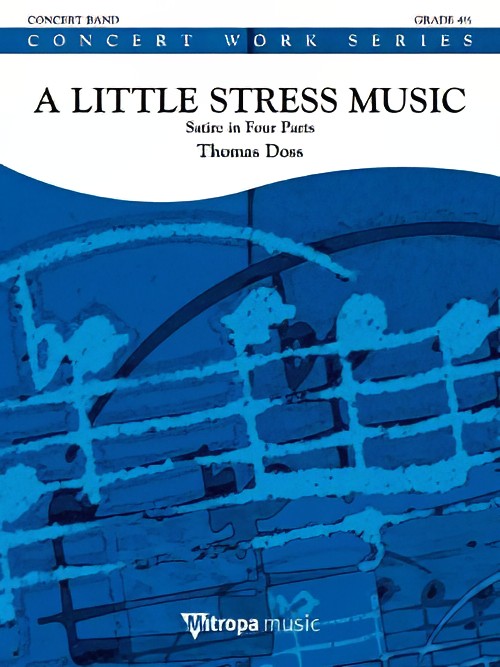 £159.99
£159.99A Little Stress Music (Concert Band - Score and Parts) - Doss, Thomas
A Little Stress Music was commissioned by the Lenzing Werkskapelle from Austria and comprises of four sections. 'Rush Hour' depicts a Friday evening during which everyone wants to get home after work. Unfortunately, traffic jams and gridlock stand in the way! In 'Promenade Waltz' you can picture an evening walk along the beautiful lakeside, then a glass of wine loosens you up leading to the third movement: 'Romance', which starts with a promising conversation...The funny finale 'Monday Morning' brings you back to reality and the score provides the option of the band applauding itself for a job well done! A humorous and joyful piece by Thomas Doss! Duration: 12.15
Estimated dispatch 7-14 working days
-
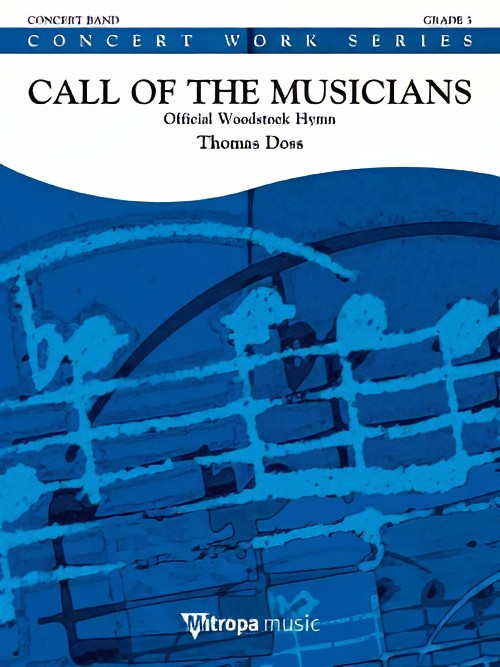 £84.99
£84.99Call of the Musicians (Concert Band - Score and Parts) - Doss, Thomas
The Woodstock der Blasmusik (Woodstock for Wind Music) is a four-day open air festival that has taken place annually over the last weekend in June in the Upper Austrian community of Ort im Innkreis since 2011. All sorts of bands and ensembles gather to play both traditional and modern wind music. Since its inception, this legendary festival has developed into a great success story. In 2019, Thomas Doss was commissioned to compose this official Woodstock hymn.Duration: 4.30
Estimated dispatch 7-14 working days
-
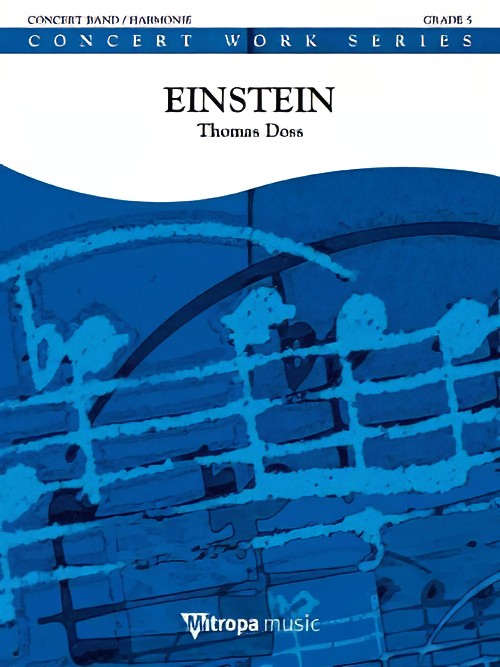 £184.99
£184.99Einstein (Concert Band - Score and Parts) - Doss, Thomas
Theoretical physicist and Nobel prize winner Albert Einstein (1879 - 1955) developed the theory of relativity, one of the basic tenets of modern physics: who doesn't know his formula E = mc2? This impressive, exciting work from Thomas Doss tells the life story of Einstein using spectacular effects to enforce the musical ideas. This is a daring and original choice for a contest and surely a guaranteed success as a main piece for your concerts.Duration: 13.00
Estimated dispatch 7-14 working days
-
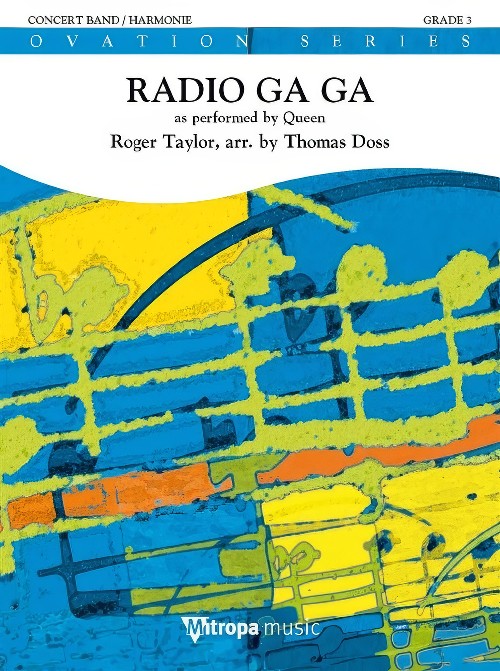 £84.99
£84.99Radio Ga Ga (Concert Band - Score and Parts) - Taylor, Roger - Doss, Thomas
This 1983 hit performed by Queen became a huge success not only because of the universal meaning of the lyrics, but also because of the iconic official video. The Austrian composer and arranger Thomas Doss, also a big fan of Queen's music, made this refreshing grade 3 arrangement. This title will certainly spice up your concert! Duration: 4.30
Estimated dispatch 7-14 working days
